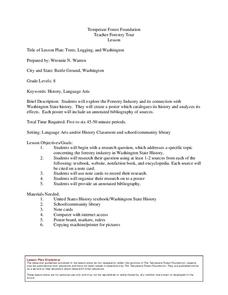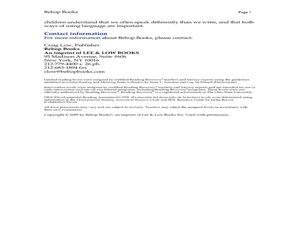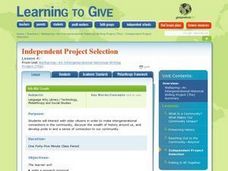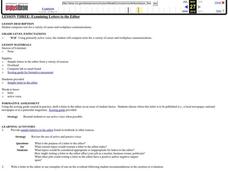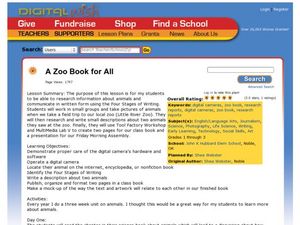Curated OER
Middle Ages Timeline
Students research a historical figure from the Middle Ages. In this Middle Ages instructional activity, students present important events of their characters life and of the time. Students write a time card for each...
Curated OER
Natural Disasters: An Adventure in Non-Fiction
Students study different natural disasters. In this natural disaster lesson students read a nonfiction book followed by a discussion, an experiment, then collect illustrations from their experience.
Curated OER
Tales From Around the World
Students read stories. In this culture lesson, students read stories from different regions around the world. Students look for each region on the map and listen for interesting cultural details in the story. Students then discuss the...
Curated OER
Trees, Logging, and Washington
Eighth graders explore how the Forestry Industry and Washington State history are related. In this forestry lesson, 8th graders research research a specific topic related to the forestry industry. Students write notes on note cards.
Curated OER
Very Good Facts About Very Good Books
Young scholars identify the characteristics of fiction and non-fiction texts. In this genre study lesson, students read the books A Butterfly Alphabet Book and I Wish I Were a Butterfly. Young scholars develop a graphic organizer to...
Curated OER
Fishing Fun
Students complete pre reading, writing, during reading, and interdisciplinary activities for the book Fishing Fun. In this reading lesson plan, students complete journal entries, go over vocabulary, answer short answer questions, have...
Curated OER
Titanic
Students conduct research with the purpose of writing a report about the Titanic. They use a variety of resources. The students produce a written document that has plenty of documented information. They also compare the information that...
Curated OER
Chameleons Are Cool!
Have your learners review what they know about camouflage using this lesson. Learners fill out a graphic organizer listing what they know or have questions about. This could be enhanced with the addition of a writing assignment in which...
Curated OER
Independent Project Selection
Pupils write research proposals, conduct research and interviews and maintain a log of their work, and draft, revise, and edit final written projects to produce a finished research article.
Curated OER
Examining Letters to the Editor
Students write letters to the editor. In this written communication instructional activity, students read sample letters to the editor and use the active voice to compose letters to the editor about issues they are interested in.
Curated OER
Autobiography
Sixth graders read and write autobiographical sketches, determine the author's purpose in writing, and type paragraphs using WP utilities.
Curated OER
Everybody Needs a Rock
Second graders examine science non-fiction books in the 500 section of the media center. They listen to Byrd Baylor's, Everybody Needs a Rock, and write a sentence that tells why everyone does need a rock. They illustrate the sentence.
Curated OER
Reading Non-Fiction
Students identify the key features of printed non-fiction texts. In this deciphering texts lesson, students watch a video clip of a news program and a children's program to compare presentations. Students also identify...
Curated OER
Genres, Genres Everywhere
Young readers assume the role of Genre Sleuths to investigate the characteristics of folktales, fantasies, and mysteries. For this session you will need to collect a variety of books on a topic you have been studying. Groups then examine...
EngageNY
Adding to Cascading Consequences and Stakeholders: Hunter-Gatherer Food Chain
Could the hunter-gatherer food chain feed everyone in the United States? To consider the question, pupils use their research and add to the Cascading Consequences chart based on Michael Pollan's hunter-gatherer food chain from The...
Main Memory Network
Longfellow's "The Village Blacksmith" and Whitman's "Song of Myself"
Although the work Americans do has changed over time, the plight of the American worker has largely remained the same. Facilitate a class discussion aboutAmerican workers using Henry Wadsworth Longfellow's "The Village Blacksmith" and...
EngageNY
Local Sustainable Food Chain: Determining Cascading Consequences Using The Omnivore’s Dilemma
What are the consequences of the local, sustainable food chain? Research teams explore the question as they review Michael Pollan's The Omnivore's Dilemma. The teams complete Cascading Consequences charts and then choose research topics...
Curated OER
Coral Reefs
Students examine the animals that live in a coral reef and how they adapt to their environment. In this coral lesson students write a short book on how animals inhabit the coral reefs.
Curated OER
Sequencing
Young scholars consider how cause and effect translate into sequencing in literary works. In this sequencing lesson, students read non-fiction passages about Eleanor Roosevelt and Clara Barton. Young scholars complete graphic organizers...
Curated OER
Let Me Tell You About My Favorite Animal
Students create books about their favorite animals using graphic organizers.
Curated OER
To a Place Like No Other (Galapagos Islands)
Students research and collect information on the Galapagos Islands. In this Galapagos Islands lesson, students find information for a jeopardy game, a first person account and a geological discovery related to the Galapagos Islands.
Curated OER
Publisher Brochures
Students create brochures on subjects they are studying in Publisher. For this nonfiction writing lesson, students use Publisher to create a brochure telling all the main ideas of a topic they are studying. Students use text boxes, fonts...
Curated OER
A Zoo Book for All
A visit to the local zoo launches an integrated life science/ language arts research project into the habitat, feeding habits, offspring, lifespan, and other interesting facts about animals. Each group selects two animals to photograph...
Curated OER
How-To Books
Students apply their knowledge and create a how-to book of their own. In this early childhood language arts worksheet, students learn about non-fiction books and write their own procedural non-fiction booklets.
Other popular searches
- Nonfiction Writing
- Nonfiction Writing Technique
- Nonfiction Summary Writing
- Nonfiction Writing Rubrics
- Narrative Nonfiction Writing
- Leads in Nonfiction Writing
- Creative Nonfiction Writing
- Editing Nonfiction Writing
- Nonfiction Writing Lessons
- Types on Nonfiction Writing
- Nonfiction Research Writing
- Writing a Nonfiction Summary



